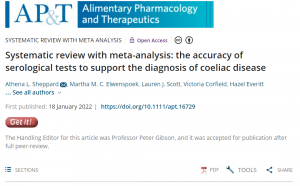How reliable are blood tests in diagnosing coeliac disease?
19 January 2022
Researchers from the NIHR Applied Research Collaboration West (ARC West) and the Universities of Bristol, Southampton and University College London, have analysed 113 studies to estimate how reliable commonly used blood tests are in diagnosing coeliac disease in both adults and children.
Coeliac disease affects around 1 per cent of people in the UK, but it’s thought less than a quarter are diagnosed. The only treatment available is a gluten-free diet. In current practice, blood tests are used to rule out coeliac disease, with biopsies then often used to confirm diagnosis, especially in adults. The researchers found anti-tissue transglutaminase tests for children can rule out coeliac disease in children, but are not as good at ruling out coeliac disease in adults. If any of the blood tests in the study give a very high result, it may be accurate enough to diagnose coeliac disease, but more research is needed to confirm what test result is sufficient to rule in coeliac disease.
In clinical practice there is a move towards avoiding invasive biopsies, where a core of gut tissue is taken for analysis, and instead relying more on blood tests to diagnose coeliac disease. However, this is not yet standard practice for all patient groups or recommended in all guidelines. Biopsies for coeliac disease are unpleasant as a tube is fed through the mouth to the small intestine, and children undergoing them are usually given general anaesthetic. Patients often have to wait for the procedure, while having to continue to eat gluten so as not to influence the result. Using blood tests alone would save the NHS money and allow patients to be diagnosed more quickly.
Athena Sheppard, who was lead author on the paper while working for the NIHR Applied Research Collaboration West (ARC West) and University of Bristol, said:
“While there has been a move towards using blood testing alone to confirm diagnosis, our review is the largest and most thorough analysis of the evidence yet. Our findings reinforce current practice.”
Paper
